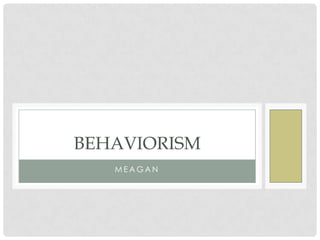
Behaviorism
- 1. BEHAVIORISM MEAGAN
- 2. SUMMARY OF THEORY • Behaviorism – “the prediction and control of human behavior in which introspection and/or independent thinking play no essential part of its teaching methods” • Operates on principle of stimulus response • All behavior is caused by external stimuli or operant conditioning • A view that assumes a learner is passive that responds to environmental stimuli • Behavior is shaped through positive or negative reinforcement • Learning is defined as a change in behavior in the learner
- 3. SUMMARY OF THEORY • According to a behaviorist, human learning is an objective and experimental branch of science • There is no internal cognitive processing of information • Believes there is no difference in the way a human and a dog thinks
- 4. IVAN PAVLOV • Became famous for his behavioral experiments with dogs • Won the Nobel Prize in Physiology in 1904 • Used the method of classic conditioning which is when the natural reflex occurs in response to a stimulus • Some believe this technique had human application
- 5. B.F. SKINNER • Focuses on another type of conditioning known as operant conditioning which states “learning is controlled and results in shaping behavior through the reinforcement of stimulus-response patterns” • Conducted experiments with pigeons • Believed that people shape their behavior based on the rewards or positive reinforcement they receive
- 6. B.F. SKINNER • Discovered that reinforcement is a powerful motivator • Found that when a desirable behavior is produced and rewarded it will be repeated • Classroom management techniques are based on these principles “Education is what survives when what has been learned has been forgotten.” -B.F. Skinner
- 7. ALBERT BANDURA • Famous for the development of the Social Cognitive Theory which he based off his ideas on social learning • Focuses on motivational factors instead of environment mechanisms • Believes that people acquire behaviors through observation of others, then, they imitate what they have observed
- 8. ALBERT BANDURA • Focused his work on the concept of self-efficacy (a personal observation about one’s perceived ability to feel, think, and motivate oneself to learn) • Analyzed people’s personality through the interaction of the environment, the behavior, and the person’s psychological processes • Started to consider a person’s ability to retain information through images in the mind known as imagery • Called the father of the cognitive movement • Theory has been called a bridge between behaviorist and cognitive learning theories because it encompasses attention, memory, and motivation
- 9. CLASSROOM IMPLICATIONS • Teachers under this theory reward the students when the students perform desirable actions like answering a question correctly or helping another student with a problem • Teachers under this theory also discipline the students when they don’t perform desirable action like when a students hits another student • Teachers can also discipline by giving the student a bad grade in order for the student to associate bad behavior with bad grades • Also, when the student is on a computer based instruction and the student gets the answer correct the program provides positive reinforcement
- 10. CLASSROOM IMPLICATIONS • Students under this theory perform actions that are either positive or negative • Students then receive reinforcement by the teacher either positive or negative depending on their actions • When students receive positive reinforcement they most likely will repeat the action again • When students receive negative reinforcement they will most likely not repeat the action again • When on a program, students answer questions and receive positive reinforcement with animations when they answer a question correctly
- 11. THOUGHTS ABOUT THEORY • I personally like this theory a lot • I would use this theory in my classroom • I think this theory works in teaching the students the desirable and undesirable actions by providing reinforcement • This theory teaches students to associate bad behavior or wrong answers with negative reinforcement and good behavior or correct answers with positive reinforcement
- 12. CREDITS • http://www.learning-theories.com/ • http://www.learningandteaching.info/learning/inde x.htm • Google images • Integrating Technology and Digital Media in the Classroom